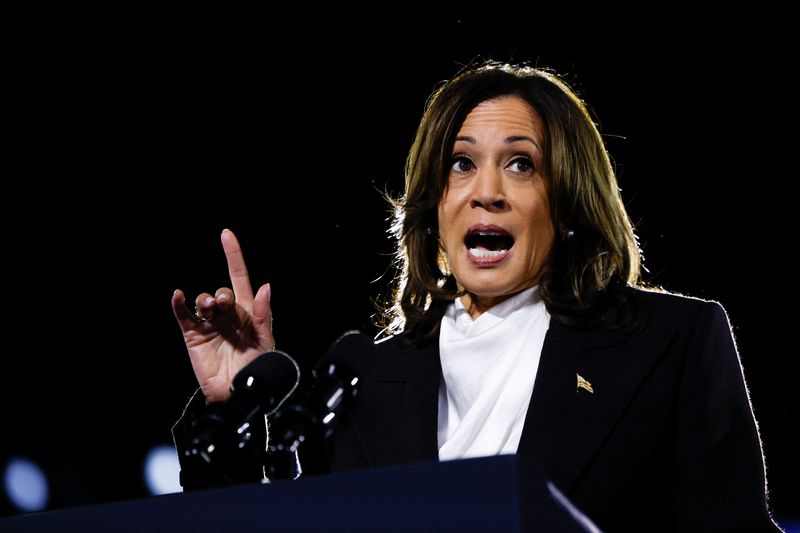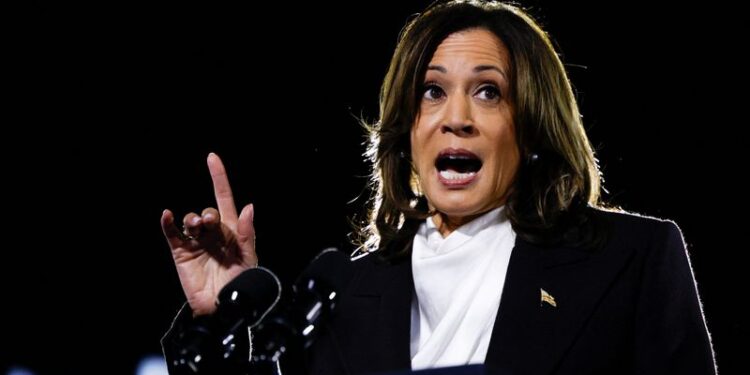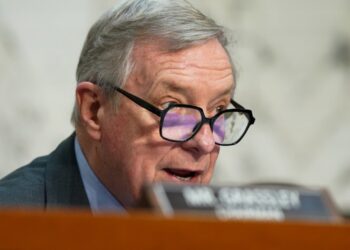By Jeff Mason and Steve Holland
WASHINGTON (Reuters) -Democrat Kamala Harris warned tens of thousands of people in Washington gathered at her biggest-ever rally that her Republican opponent Donald Trump was seeking unchecked power as their race for the White House entered its final week.
Harris spoke on Tuesday evening to an outdoor rally estimated by her campaign to number more than 75,000 people at the spot near the White House where on Jan. 6, 2021, Trump addressed his supporters before they attacked the U.S. Capitol.
“We know who Donald Trump is,” Harris said, adding the former president “sent an armed mob” to the U.S. Capitol in an attempt to overturn his loss in the 2020 presidential election.
“This is someone who is unstable, obsessed with revenge, consumed with grievance and out for unchecked power,” Harris said during her campaign’s closing argument before a tightly contested Nov. 5 election.
Harris was flanked by American flags on stage and surrounded by blue and white banners that said “FREEDOM” with the lit-up White House in the background.
A Reuters/Ipsos poll on Tuesday showed that Harris’ lead had eroded to just 44% to 43% among registered voters.
Harris has led Trump in every Reuters/Ipsos poll since she entered the race in July, but her advantage has steadily shrunk since late September.
Trump and his allies have sought to play down the violence of Jan. 6.
Thousands of his supporters stormed the Capitol, sending lawmakers fleeing for their lives and chanting “Hang Mike Pence” the vice president, after Trump’s address on the Ellipse, where as president he told the crowd to “fight like hell” to prevent Pence and Congress from ratifying his loss.
Four people died in the ensuing riot at the Capitol, and one police officer who defended the Capitol died the following day. Trump has said that if reelected, he would pardon the more than 1,500 participants who have been charged with crimes.
Earlier in Florida, Trump’s campaign tried to move on from racist and other vulgar remarks made by allies at his rally in New York City on Sunday. Trump defended called the event “an absolute lovefest.”
Trump did not comment on the rhetoric used by speakers at the event, where a comedian called Puerto Rico a “floating island of garbage” and disparaged Black Americans, Jewish people, Palestinians and Latinos.
Though his campaign has said the comments about Puerto Rico did not reflect the former president’s views, Trump called the event a lovefest. “And it was my honor to be involved,” he said.
COURTING HISPANIC VOTERS
Some 51 million Americans have already voted in the election, according to Election Hub at the University of Florida, in a battle that will decide who runs the world’s richest and most powerful country for four years.
Harris, who would be the first female president, and Trump, seeking a return to office after his 2017-21 term, diverge on support for Ukraine and NATO, tariffs that could trigger trade wars, abortion rights, taxes and basic democratic principles.
The candidates are neck and neck in the seven battleground states that will decide the election.
Trump has said Harris would be too dangerous to serve as president, pointing to foreign wars and high levels of immigration during her tenure as vice president.
He said she had waged a campaign of destruction. “But really more than anything else it’s a campaign of hate,” he said.
Both candidates are seeking to cement voters’ opinions in the final days of a historically close election.
Trump aims to capitalize on voters’ unhappiness with rising prices and immigration, while Harris has emphasized abortion rights and has described Trump as an aspiring dictator who would undermine U.S. democracy.
As Harris spoke in Washington, Trump was visiting a heavily Hispanic city in Pennsylvania, two days after comedian Tony Hinchcliffe’s comments about Puerto Rico drew outrage at the New York rally.

Puerto Ricans are the largest Hispanic group in Pennsylvania, the most crucial battleground state to win as it holds the highest number of Electoral College votes of the seven battleground states, according to the Census Bureau.
“I’d like to begin with a very, very simple question: Are you better off now than you were four years ago? I’m here today with a message of hope for all Americans,” he said.







